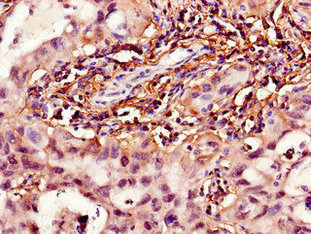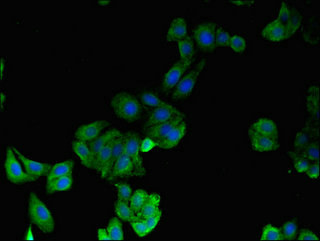HPGD Antibody
-
货号:CSB-PA010702LA01HU
-
规格:¥440
-
促销:
-
图片:
-
其他:
产品详情
-
产品名称:Rabbit anti-Homo sapiens (Human) HPGD Polyclonal antibody
-
Uniprot No.:P15428
-
基因名:HPGD
-
别名:15 hydroxyprostaglandin dehydrogenase [NAD+] antibody; 15 PGDH antibody; 15-hydroxyprostaglandin dehydrogenase [NAD+] antibody; 15-PGDH antibody; 15PGDH antibody; Hpgd antibody; Hydroxyprostaglandin dehydrogenase 15 (NAD) antibody; NAD+ dependent 15 hydroxyprostaglandin dehydrogenase antibody; OTTHUMP00000218960 antibody; OTTHUMP00000219016 antibody; OTTHUMP00000219018 antibody; PGDH antibody; PGDH_HUMAN antibody; PGDH1 antibody; PHOAR1 antibody; Prostaglandin dehydrogenase 1 antibody; SDR36C1 antibody; Short chain dehydrogenase/reductase family 36C member 1 antibody
-
宿主:Rabbit
-
反应种属:Human
-
免疫原:Recombinant Human 15-hydroxyprostaglandin dehydrogenase [NAD(+)] protein (14-130AA)
-
免疫原种属:Homo sapiens (Human)
-
标记方式:Non-conjugated
本页面中的产品,HPGD Antibody (CSB-PA010702LA01HU),的标记方式是Non-conjugated。对于HPGD Antibody,我们还提供其他标记。见下表:
-
克隆类型:Polyclonal
-
抗体亚型:IgG
-
纯化方式:>95%, Protein G purified
-
浓度:It differs from different batches. Please contact us to confirm it.
-
保存缓冲液:Preservative: 0.03% Proclin 300
Constituents: 50% Glycerol, 0.01M PBS, PH 7.4 -
产品提供形式:Liquid
-
应用范围:ELISA, IHC, IF
-
推荐稀释比:
Application Recommended Dilution IHC 1:20-1:200 IF 1:50-1:200 -
Protocols:
-
储存条件:Upon receipt, store at -20°C or -80°C. Avoid repeated freeze.
-
货期:Basically, we can dispatch the products out in 1-3 working days after receiving your orders. Delivery time maybe differs from different purchasing way or location, please kindly consult your local distributors for specific delivery time.
相关产品
靶点详情
-
功能:Primary enzyme catalyzing the conversion of hydroxylated arachidonic acid species to their corresponding oxidized metabolites (Probable). Prostaglandin inactivation, catalyzes the first step in the catabolic pathway of the prostaglandins. Contributes to the regulation of events that are under the control of prostaglandin levels. Catalyzes the NAD-dependent dehydrogenation of lipoxin A4 to form 15-oxo-lipoxin A4. Converts 11(R)-HETE to 11-oxo-5,8,12,14-(Z,Z,E,Z)-eicosatetraenoic acid (ETE). Has hydroxylated docosahexaenoic acid metabolites as substrates. Converts resolvins E1, D1 and D2 to their oxo products which represents a mode of resolvins inactivation and stabilizes their anti-inflammatory actions.
-
基因功能参考文献:
- Higher enzyme levels of 15-PGDH exist in the lumen of intracranial aneurysms of men compared with women. This observation could explain why aspirin confers better protection against IA rupture in men than in women. PMID: 29042428
- HPGD expression in colorectal cancer and its role in cetuximab resistance PMID: 28320945
- Results found that low 15-PGDH expression was significantly associated with advanced tumors, presence of lymph node metastasis and invasion, and poor prognosis in pancreatic ductal adenocarcinoma patients. PMID: 29224225
- The reduced 15-PGDH may result in PGE2 accumulation which sustains carcinogenesis and tumor progression. We further found that miR-21 exert its oncogenic role through PGE2/PI3K/Akt/Wnt/beta-catenin axis in gastric cell proliferation. In conclusion, our findings enlarged our knowledge in the roles of miR-21 in the progression of gastric cancer. PMID: 29101039
- WNT5A signaling regulates 15-PGDH expression. PMID: 27522468
- miR-21-HPGD regulatory module may play an important role as part of a feed-forward loop that regulates the PGE2 signaling. Such a feed-forward regulatory mechanism likely plays a critical role in OTSCC initiation and progression. PMID: 27561985
- inhibitory effects of 17-AAG on PGE2 levels in HT-29 colorectal cancer cells were mediated through modulating COX-2 and 15-PGDH expression. PMID: 27075590
- A common mutation and a novel mutation in HPGD gene were identified to be responsible for primary hypertrophic osteoarthropathy PMID: 26135126
- Peroxisome proliferator-activated receptors (PPARs) play pivotal roles in maintenance of Chorionic NAD-dependent 15-hydroxy prostaglandin dehydrogenase (PGDH) expression in chorion during human pregnancy. PMID: 26093984
- Neoadjuvant chemotherapy could increase 15-PGDH expression in advanced gastric cancer patients, and 15-PGDH may serve as a candidate prognostic biomarker of advanced GC response to therapy. PMID: 26261578
- 15-PGDH mRNA levels were significantly higher in aorta samples from patients undergoing abdominal aortic aneurysm repair than in those from healthy multiorgan donors. PMID: 26287481
- a homozygous 2-bp deletion (c.310_311delCT or p.L104AfsX3) was identified two primary hypertrophic osteoarthropathy siblings PMID: 24533558
- Omega-3 polyunsaturated fatty acids upregulate the expression of 15-PGDH by inhibiting miR-26a and miR-26b. PMID: 25691459
- Multiple drug resistance-associated protein 4 (MRP4), prostaglandin transporter (PGT), and 15-hydroxyprostaglandin dehydrogenase (15-PGDH) as determinants of PGE2 levels in cancer. PMID: 25433169
- Loss of PGDH expression is associated with esophageal squamous cell carcinoma and adenocarcinoma. PMID: 25735395
- A single nucleotide polymorphism in the 3' untranslated region (UTR) of the 15-hydroxyprostaglandin dehydrogenase (HPGD) gene modifies mir-485-5p binding in breast cancer. PMID: 25003827
- Case Reports: novel 2-bp homozygous deletion was found in exon 3 (c.310-311delCT) of HPGD gene in the patients with Primary hypertrophic osteoarthropathy. PMID: 24816859
- Tissues from 15-PGDH knockout mice demonstrate similar increased regenerative capacity. PMID: 26068857
- Hypertrophic osteoarthropathy in the Chinese family is caused by a homozygous mutation (c.310_311delCT) in the HPGD gene. PMID: 25863089
- Data show that hydroxylated Omega-3 fatty acid species are conferred with cell signaling capabilities after oxidation by 15-Hydroxyprostaglandin dehydrogenase (15PGDH). PMID: 25586183
- these findings suggest that 15 d-PGJ2 induces the expression of 15-PGDH through ROS-mediated activation of ERK1/2 and subsequently Elk-1 in the MDA-MB-231 cells PMID: 25773924
- Cholangiocarcinogenesis and tumor progression are regulated by a novel interplay between COX-2/PGE2 and miR-21 signaling, which converges at 15-PGDH. PMID: 24699315
- Genetic variability in key genes in prostaglandin E2 pathway (COX-2, HPGD, ABCC4 and SLCO2A1) and their involvement in colorectal cancer development. PMID: 24694755
- 15-PGDH expression level in normal colon mucosa may serve as a biomarker that may predict stronger benefit from aspirin chemoprevention. PMID: 24760190
- 15-PGDH/15-KETE stimulates the cell cycle progression and proliferation of pulmonary arterial smooth muscle cells involving ERK1/2-mediated PAR-2 expression, and contributes to hypoxia-induced pulmonary vascular remodeling. PMID: 24657469
- 15-PGDH is downregulated in human hepatoma cells with a high COX-2 expression, in chemical and genetic murine models of hepatocellular carcinoma (HCC) and in human HCC biopsies. PMID: 23954207
- The 15-PGDH gene is a MiTF-CX target gene in cervical stromal cells and is down-regulated by PGE2 through EP2 receptors. PMID: 24471568
- The T allele showed increased cancer risk and decreased 15-PGDH expression. PMID: 23717544
- Decreased PGDH expression is associated with increased GR and PRA, although decreased PRB, in chorion during labor. PMID: 23506845
- Colonic 15-PGDH levels are highly reproducible within individuals and stable along the length of the colon PMID: 23625286
- H. pylori appeared to promote gastric carcinogenesis by suppressing 15-PGDH. PMID: 23430757
- beta-catenin has a novel role in promoting colorectal tumorigenesis through very early 15-PGDH suppression leading to increased PGE(2) levels, possibly even before COX-2 upregulation. PMID: 22082586
- protein tyrosine nitration of 15-hydroxy prostaglandin dehydrogenase in the human mast cells PMID: 22197745
- Data suggest that reduction of 15-PGDH is associated with carcinogenesis and development of gastric carcinoma. PMID: 22416177
- Our results indicate that HPGD is highly expressed in metastatic and aggressive breast cancer and promotes epithelial-mesenchymal transition and migration in breast cancer cells. PMID: 22072156
- clinical and biochemical data of three unrelated primary hypertrophic osteoarthropathy families with HPGD mutations; evidence that c.175_176del is a recurrent mutation rather than an ancient founder allele PMID: 21426412
- Report homozygous mutations in the 15-hydroxyprostaglandin dehydrogenase gene in patients with primary hypertrophic osteoarthropathy. PMID: 19306095
- Results demonstrate that 15-PGDH acts as a tumor suppressor in gastric cancer and provide further validation for 15-PGDH as a potential therapeutic target for gastric cancer. PMID: 20699658
- Demonstrate both downregulation and a tumor suppressor activity of 15-PGDH in gastric cancer. PMID: 21469975
- The PLA2G7, HPGD, EPHX2, and CYP4F8 genes are highly expressed in prostate cancer. PMID: 21281786
- The c.175_176delCT frameshift mutation appears to be recurrent and to be the commonest HPGD mutation in Caucasian families with primary hypertrophic osteoarthropathy. PMID: 20299379
- Data show that the Vmax for the oxidation of PGE2 was 28.1 micromol/(min.mg), and the catalytic constant, kcat, was about 14 per second; the catalytic efficiency, kcat/Km, was 2.5.106. PMID: 21072165
- our data do not support the previously reported associations of HPGD tagSNPs and risk of colorectal cancer. PMID: 21047993
- Reduced expression of 15-PGDH contributes to the elevated levels of PGs found in the skin following UVR exposure. PMID: 20643784
- The study shows that cPLA2 and mPGES-1, in addition to COX-2, are constitutively overexpressed, and that 15-PGDH might be attenuated in colorectal cancer. Furthermore, cPLA2 and 15-PGDH as well as COX-2 could have an important role in tumor progression. PMID: 20635443
- analysis of expression of serum vitamin D receptor, cyclooxygenase-2, and 15-hydroxyprostaglandin dehydrogenase in benign and malignant ovarian tissue and 25-hydroxycholecalciferol and prostaglandin E2 in ovarian cancer patients PMID: 20304053
- These results suggest that enhanced PGE2 production proceeds through the expressions of COX-2 and microsomal PGES-1 and down-regulation of PGDH by SNAI2 in pancreatic tumors. PMID: 19820419
- Loss of PGDH expression contributes to a more malignant bladder cancer phenotype and may be necessary for bladder cancer development and/or progression. PMID: 20093479
- Genetic variants in HPGD encoding 15-PGDH, appear to modulate colorectal risk. The present study appears to be the first to evaluate possible associations between genetic heterogeneity in HPGD and CRC risk. PMID: 20042636
- reduction of 15-PGDH is an independent predictor of poor survival associated with enhancement of cell proliferation in gastric adenocarcinoma. PMID: 19917058
显示更多
收起更多
-
相关疾病:Hypertrophic osteoarthropathy, primary, autosomal recessive, 1 (PHOAR1); Cranioosteoarthropathy (COA); Isolated congenital nail clubbing (ICNC)
-
亚细胞定位:Cytoplasm.
-
蛋白家族:Short-chain dehydrogenases/reductases (SDR) family
-
组织特异性:Detected in colon epithelium (at protein level).
-
数据库链接:
HGNC: 5154
OMIM: 119900
KEGG: hsa:3248
STRING: 9606.ENSP00000296522
UniGene: Hs.596913
Most popular with customers
-
-
YWHAB Recombinant Monoclonal Antibody
Applications: ELISA, WB, IF, FC
Species Reactivity: Human, Mouse, Rat
-
Phospho-YAP1 (S127) Recombinant Monoclonal Antibody
Applications: ELISA, WB, IHC
Species Reactivity: Human
-
-
-
-
-























